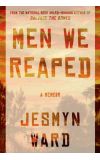
06 Mar 2014 23:22:51
Such is the precarity of young black male life in the US and the paucity of the options available to so many – almost one in 10 young black men are in jail and murder is the greatest killer of black men under the age of 24. It is to these statistics that Jesmyn Ward attempts to give both humanity and context in her memoir, in which she relates the unconnected deaths in the space of just four years of five young men who were close to her. "By all the official records," she writes, "here at the confluence of history, of racism, of poverty, and economic power, this is what our lives are worth: nothing."
This book is not for the light-hearted. There's a suicide, two car accidents, a drug overdose and a shooting: tragic tales of young people's lives cut short are interwoven with the disintegration of Ward's parents' marriage and her own sense of drift and isolation. She understands this. "That's a brutal list," she writes, "in its immediacy and its relentlessness, and it's a list that silences people. It silenced me for a long time."
Thankfully she found her voice, and by virtue of a restrained but rich style and gift for storytelling, her book does not read like the litany of woe that one might expect. Melancholic and introspective rather than morbid and self-indulgent, it is really a story of what it is like to grow up smart, poor, black and female in America's deep south. There is weed, alcohol, crushes and cliques as well as addiction, poverty, divorce and destitution. It's a coming-of-age memoir detailing a generation and community in which death, dysfunction and detention are ever-present facts of life. Michael Sam, for instance, the 24-year-old black college footballer from southeast Texas who recently came out as gay, was one of eight children. Three of his siblings are dead and two are in prison. Ward testifies to the numbing effect that such proximity to death can bring. After Demond Cook, a 31-year-old friend, is shot dead on his front lawn, the fourth to fall in as many years, she sits with his young widow thinking: "I'm only 26 … I'm tired of this shit."
A central character in the book is the Mississippi gulf coast, where Ward spent most of her childhood and youth. This lowland region of red beans and bayou would reveal its own vulnerability shortly after the last of the book's fatalities, with the devastating pounding of hurricane Katrina. Describing how she and her friends congregated the night they heard CJ Martin, 21, was killed in a car accident (just seven weeks before Cook perished) she evokes the landscape's eerie mystique: "We parked in the dark and people materialised out of the fog and woods and gathered until the sun rose, brought together again by a third tragedy."
Ward is at her most powerful when telling the story of her own family: her parents' protracted break-up, her late brother's evolution into petty drug dealing, her own self-loathing and dislocation as she attends an overwhelmingly white private school funded by a family her mother cleans for – and then her departure for college.
In a conversation dominated by the fate of black men she also skilfully unpacks the gendered complexities in this state of siege – the women in her community are both protective of and disappointed in their menfolk. "[As a child] I saw the tight line of my mother's mouth when my father was absent and couldn't be accounted for … To an impressionable nine-year-old trouble for the black men of my family meant police. It was easier and harder to be male; men were given more freedom but threatened with less freedom."
The book's structure, however, hollows out much of its emotional impact. Ward effectively narrates her grief backwards, starting with the demise of Roger Daniels, who died of a heart attack after taking cocaine and tablets in 2004, and ending with her brother's car crash in 2000. Quite why is not clear, but the effect is to both dull and confuse the accumulated impact of each successive loss. We are introduced to her driving home from university in Michigan fearing the worst for the holidays. She's told us of the deaths that have gone before but the journey to her state of mind at that point has not yet been made. So when she writes: "I hope nobody died this summer", it doesn't quite connect, and the shock of her brother's accident is diminished.
Nonetheless, the power of her story lies not only in her proximity to the fatalities but, as she points out at the beginning, in their relentless occurrence. The grief accumulates; Ward shifts from feeling unlucky to have suffered a single bereavement to feeling stalked by tragedy.
The morbid realities of young black life in America, hidden in plain sight, are not just marginalised: they are disappeared by the very social ills – poor education, incarceration, death and exclusion – that created them. "We who survived the camp are not true witnesses," wrote Primo Levi of his time in Auschwitz. "We, the survivors, are not only a tiny but an anomalous minority. We are those who through prevarication, skill or luck never touched bottom. Those who have, and have seen the face of the Gorgon, did not return, or returned wordless."
Anyone who emerges from America's black working-class youth with words as fine as Ward's deserves a hearing. As such The Men We Reaped is an eloquent account of a psychological, sociological and political condition all too often dismissed as an enduring pathology.

